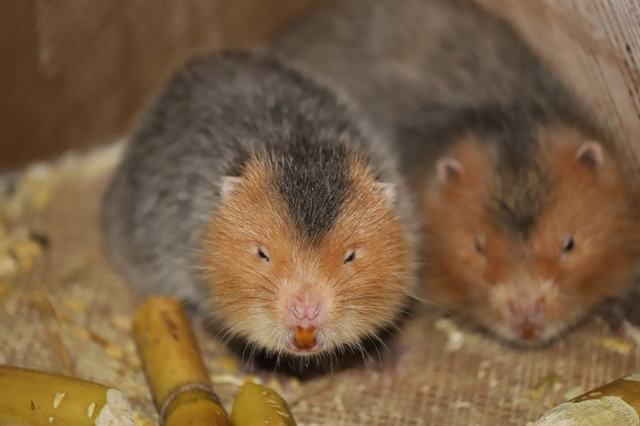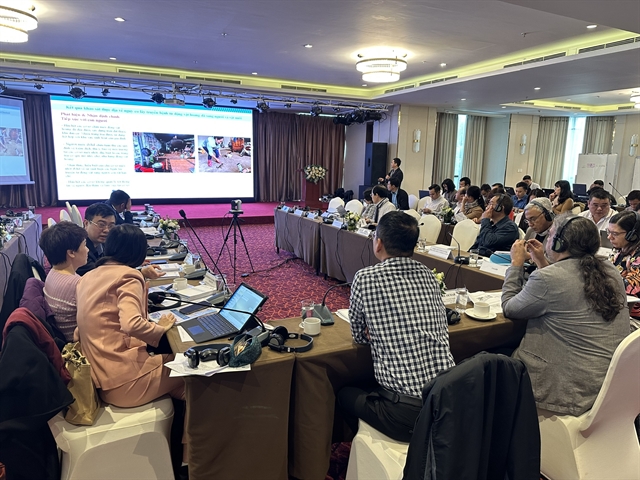 |
| Civet farming in Minh Hồng Commune, Phú Xuyên District, Hà Nội. — Photo courtesy of GIZ/Đỗ Doãn Hoàng |
HÀ NỘI — Representing one of the global hot spots for potential zoonotic disease emergence, Việt Nam is one of the most proactive countries in the region in attempts to mitigate and minimise the risks of infectious diseases and emerging diseases, especially zoonotic ones.
“Reducing health risks in the wildlife trade in Việt Nam”, a two-year joint cooperation project between Germany and Việt Nam, has been carried out to strengthen the Government’s efforts to ensure biosecurity in the many facilities that are farming wild animals.
Numerous policy and technical recommendations have been developed and are ready for implementation.
The project results were presented in a workshop on Tuesday, which was co-chaired by the Ministry of Agriculture and Rural Development (MARD) and the Deutsche Gesellschaft für Internationale Zusammenarbeit (GIZ) through the One Health Partnership Secretariat.
The project achieved its three objectives, which are applied research activities; policy review; and policy consultation to strengthen the management of commercial wildlife farming activities towards reducing risks, and preventing zoonotic transmission and spillover from wildlife to humans.
The workshop also aims to raise awareness on the One Health approach to reduce the risk of zoonotic diseases arising from wildlife farming.
Insights were provided on the One Health approach, which aims to balance and optimise the health of people, animals and the environment.
It is part of the global project to support “The International Alliance against Health Risks in Wildlife Trade”. It is commissioned by the German Federal Ministry for Economic Cooperation and Development (BMZ) and supported by the German Federal Ministry for the Environment, Nature Conservation and Nuclear Safety (BMUV).
 |
| The workshop on Tuesday was attended by representatives of ministries, veterinary and forest protection departments, and international partners, in person and online. — VNS Photo Trần Tố Như |
The project contributed to reviewing the policy framework and technical standards for commercial wildlife farms in Việt Nam, thereby recommending further steps for the development of policies and measures to prevent diseases in wildlife farming.
Recommendations include the development and rigorous application of requirements for wildlife farming, including identification of criteria and procedural monitoring for high-zoonotic-risk wildlife groups and practices; and propose specific biosecurity measures based on international best practices.
Vũ Thanh Liêm, deputy director of the MARD’s International Cooperation Department, showed high appreciation for the achievements of the project.
He said: “This is a small-scale project, but it has provided meaningful support through some activities that aim to prevent future pandemics, namely reducing health risks arising from wildlife trade in Việt Nam.
“The project implementation followed the provisions of the respective laws of the two sides, in order to jointly implement national, sectoral and international commitments.”
Participants include representatives of the MARD, Ministry of Health and Ministry of Natural Resources and Environment, as well as international partners and the veterinary and forest protection departments of 19 provinces and cities nationwide.
These key stakeholders play a key role in jointly sharing, planning and supporting localities to handle challenges and needs with regard to risks of zoonotic diseases in local wildlife farming; supporting biosecurity measures in wildlife farming and strengthening monitoring of their application.
Recommendations
To advance the integration of biosecurity measures to be applied in wildlife farms in the legal framework, the project supported the amendment of Decree 06/2019/NĐ-CP and Decree 84/2021/NĐ-CP on the management of endangered, precious and rare forest plants and animals, as well as the implementation of the Convention on International Trade in Endangered Species of Wild Fauna and Flora (CITES).
Taking this input into account, the amended decree will be further refined by MARD and is expected to be endorsed in 2024.
Insights have been widely shared through various inter-sectoral multi-stakeholder platforms.
The recommendations of the project put a particular focus on new responsibilities that require the cooperation of the State, the Government, departments, organisations, and international partners to support and consolidate resources to improve policies and regulations, as well as clarify roles and functions of related organisations; strengthen coordination and cooperation between ministerial and inter-ministerial authorities; and especially enhance communication and knowledge dissemination to law enforcement authorities, communities, owners of farming establishments and local communities about risks from wildlife farming activities.
Anja Barth, the project’s chief technical advisor from the GIZ, said: “Today’s closing event of the project provides a great opportunity to disseminate the results and facilitate further exchange among different stakeholders – in line with the spirit on One Health.
“The One Health Partnership in Việt Nam and the International Alliance at a global level are important platforms that will continue working beyond the project’s lifetime. The results of the project will made available on these platforms.
“In such a way, the work in Việt Nam can be made available to a wide international audience in the future.” — VNS
- Reduce Hair Loss with PURA D’OR Gold Label Shampoo
- Castor Oil Has Made a “Huge” Difference With Hair and Brow Growth
- Excessive hair loss in men: Signs of illness that cannot be subjective
- Dịch Vụ SEO Website ở Los Angeles, CA: đưa trang web doanh nghiệp bạn lên top Google
- Nails Salon Sierra Madre
 VnExpress News The News Gateway of Vietnam
VnExpress News The News Gateway of Vietnam





